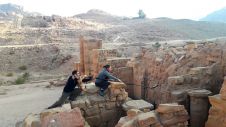The Quest for Capacity in Land Administration
The capacity to establish, maintain and sustain land administration systems varies from one country to another. In some developed countries the capacity is well established and enables maintenance and further innovation of advanced interactive land information systems. In most developing countries, however, the capacity is very sporadic in terms of both institutions and personnel.
When building land administration systems in developing countries, the quest for capacity development is fundamental. “Don´t start what you can´t sustain,” – this simple phrase indicates that measures for capacity development must be established up front when starting a project to build sustainable land administration systems. The biggest challenge is often to ensure effective and efficient management of the systems once they are established and the donors have left the country.
‘Capacity’ is the power of something – a system, an organisation or a person – to perform and produce properly. Capacity development is not only about human resources and skills; it is equally about building sustainable and trustable institutions for running the systems. Capacity development must be seen in a wider context of giving organisations and individuals the ability to perform functions effectively, efficiently and sustainably. This includes the requirement to address capacity needs at the institutional and, even more broadly, at the societal level. Capacity development does not imply that there is no capacity in existence; this also includes retaining and strengthening existing capacities of people to perform their tasks and institutions to deliver services.
Educational and training measures are of course important at all levels, from university degrees to short-term programmes for training land clerks. They should ensure that there is a sustainable long-term capacity of educated and trained personnel available within the public as well as the private sector for operating the system.
Universities have a fundamental role in educating land professionals, but they should also undertake research and capacity development through interacting with government and society to develop adequate solutions to the core land issues. In some developing regions, such as Francophone Africa, this role of the universities is not well understood and should be improved, e.g. by establishing regional centres of capacity development.
There is a need to focus on pro-poor land administration approaches for providing more flexible and fit-for-purpose solutions to building sustainable systems for security of tenure and effective management of the use of land. The scale of this task is huge given that most developing countries have a cadastral coverage of less than 30 percent and which is based on systems established in colonial times and serving mainly the elite.
The quest for capacity in land administration is a fundamental issue for implementing sustainable land administration systems and, more generally, for meeting the overall global agenda in terms of economic growth, social equity and environmental sustainability.

Value staying current with geomatics?
Stay on the map with our expertly curated newsletters.
We provide educational insights, industry updates, and inspiring stories to help you learn, grow, and reach your full potential in your field. Don't miss out - subscribe today and ensure you're always informed, educated, and inspired.
Choose your newsletter(s)












